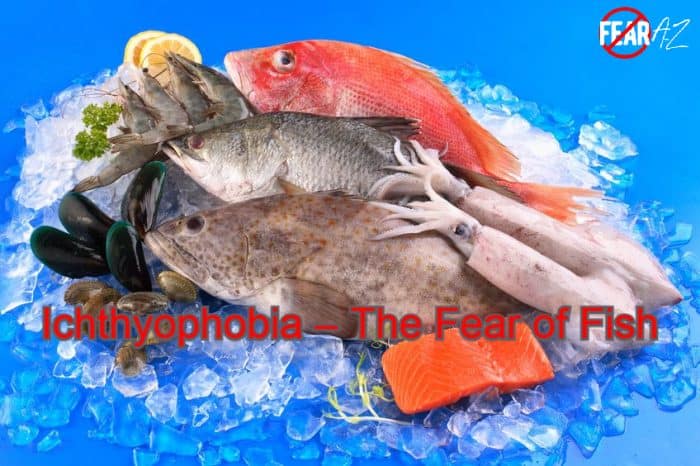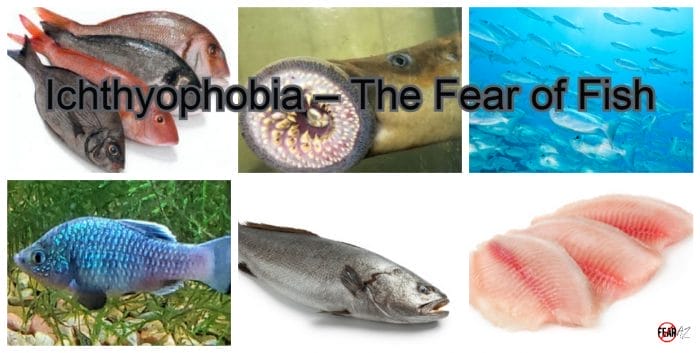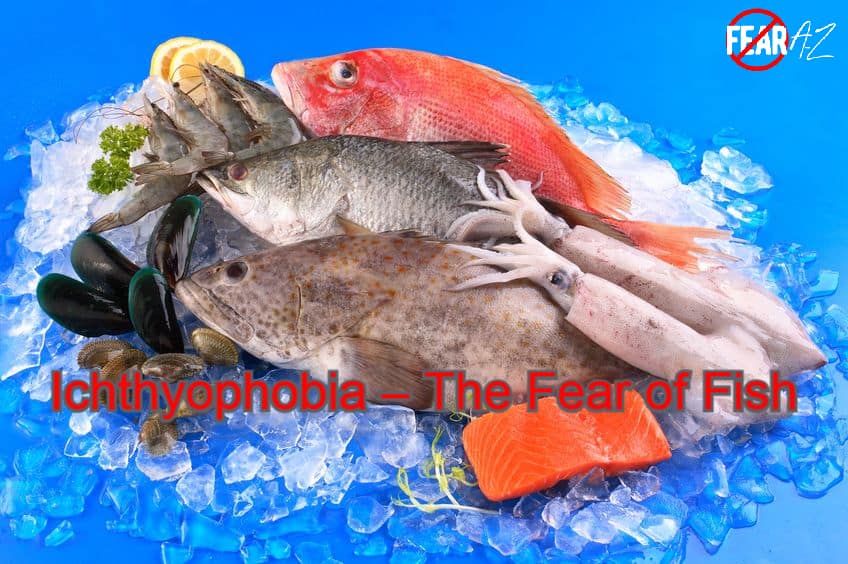Share This Article
Working through the Excessive Fear of Fish
Do you have an exaggerated fear of fish, regardless of their size?
Do you exhibit an uncontrolled and irrational fear of fish or anything that looks like a fish?
Do you experience immense anxiety from the mere thought of fish, let alone seeing one physically? Is walking through a fish market a thing of nightmares for you?
If you find yourself exhibiting intense anxiety over fish to the extent of experiencing panic attacks, you may be suffering from ichthyophobia, or the excessive fear of fish. Other signs you’re likely to experience include increased breathing rate and trembling.
This phobia can be frustrating not just for the sufferer but even for those in their social circle. It affects various facets of an individual’s life.
Individuals with this phobia might recognize that the feeling of discomfort around anything with gills and scales isn’t normal. Yet they feel powerless to control the physical symptoms related to their fear.

Let’s Learn How to Solve the Problem
The fear of certain animals is to be expected, especially when those animals may pose a real risk to health and safety. However, if this fear is dominating you and changing your behavior, it’s time you sought help.
Although admitting you have a phobia can be uncomfortable, it’s the initial step toward seeking help. Thankfully, self-help and professional guidance can help patients conquer fear and lead a life without phobias. We say phobia(s) because the fear of fish often goes hand-in-hand with the fear of water.
Since the cause of the phobia is generally unknown, there are no treatments designed specifically for the condition. However, various treatment methods offer coping skills for managing the fear. These methods can help you improve symptoms dramatically.
What Is the Deep Fear All About?
Itchyophobia involves the persistent or irrational fear of fish. This somewhat rare phobia includes situations where a sufferer fears eating fish, seeing a dead fish, being around an aquarium, smelling fish, touching a fish, and so on.
In some cases, the fear is of a specific fish, say for instance, sharks. Despite statistics revealing that the odds of a shark attack are extremely low, one may experience a phobia of sharks.
Most with this condition accept that their phobia is irrational but continue experiencing it. While some might feel tense around fish for different reasons—such as the likelihood of being harmed—these feelings can develop into a phobia when it restricts someone’s daily functioning.
Like most phobias, fear of fish can manifest differently in each of us. This is because we have different thought patterns when it comes to fish. Unlike the reaction of caution one might exhibit when encountering fish in a natural setting, for instance, at the beach, those with this phobia simply feel extreme fear.
Wherever fish are present, one will likely experience a range of emotions and physical symptoms that are typical of a very intense state of anxiety or disgust.

Some even exhibit panic or anxiety attacks. One may experience elevated blood pressure, trembling, muscle tension, and excessive sweating. While panic attacks might not always be among the symptoms, they may still arise, particularly if the symptoms are severe.
Those with a phobia might find themselves avoiding their source of fear feeling they simply can’t face fish exposure in any way. For instance, they might avoid any body of water to make sure they don’t see fish.
However, fish can be hard to avoid unless you live in the desert. You’re likely to run across fish in grocery stores, restaurants, art, department stores, the media—the list of places that may have fish or related items is endless.
Such irrational thinking and excess worry is a major source of mental anguish for some. Although those with the condition might avoid their fear to decrease the likelihood of experiencing anxiety, this is counterproductive, because it will merely escalate the symptoms in the long term.
Ichthyophobia Symptoms
Since this condition is a part of the broader category of anxiety disorders, it shares symptoms with other phobias. Symptoms can be mental, emotional, physical, and behavioral. It’s worth noting that although most display similar symptoms, the intensity and frequency of symptoms can differ from person to person.
Physical Symptoms
In this case, the phobic stimulus, which is fish, sets off a chain of events in the autonomous nervous system, which may produce the following reactions:
- Trembling and dizziness
- Increased sweating
- Nausea
- Confusion
- Pressure sensation in the chest
- Shortness of breath
Emotional Symptoms
- Panic attacks
- Anxiety
- Feeling overwhelmed
- Needing to escape
Mental Symptoms
When you have a preconceived notion or association with fish, a phobia may develop. You may begin to dwell on irrational thoughts concerning fish and their traits. These thoughts can manifest in the following ways:
- Obsessive speculation with fish
- Feeling of unreality
- Fear of the loss of control and being unable to handle the situation satisfactorily
- Intrusive and uncontrollable thoughts regarding fish
Behavioral Symptoms
Like any specific anxiety disorder or phobia, a series of behavioral symptoms accompany ichthyophobia. These behaviors happen when the person encounters fish in any way, even in their thoughts in severe cases. Those with this phobia seek to avoid or escape the dreaded situation. These behaviors are termed avoidance or escape behaviors.
Some exhibit avoidance behaviors to avoid encountering fish. They do so to prevent the feelings of anxiety and anguish triggered by these animals. Escape behaviors may emerge when one hasn’t been able to avoid encountering the stimulus in question. Such behaviors may help offer speedy escape from the present situation.
Ichthyophobia Treatment
There are several methods of treatment available for those suffering from the phobia of fish. Whether you choose self-help methods or professional guidance, you’ll find techniques to help you better manage or even learn to overcome your phobia of fish.
Self-Help
Although it can be challenging to deal with this condition, some self-help strategies can help ease your fears. When you find yourself exhibiting fear-related symptoms in reaction to fish, try a relaxation method to calm your body and mind. You can also learn to work on the phobia from a self-exposure angle.
Deep Breathing
This type of breathing helps you avoid the fight-or-flight response to situations that are physically or mentally terrifying. Relaxation techniques can help decrease nervousness while improving your relaxation reaction.
Visualization
This powerful technique can help you relax and alleviate stress. It entails using mental imagery to attain a more relaxed mental state. For instance, during an episode of panic you’re likely to dwell on the worry and other distortions that serve to worsen your fear. Visualization seeks to expand your relaxing ability by focusing your mind on calming images.
Self-Exposure
Although professional treatment under a therapist is ideal, you could adopt a self-help approach to ease your fears. Begin by visualizing yourself near fish, and then adopt relaxation approaches to calm yourself. Over time, expose yourself gradually to the stimulus. You’ll find it easier to attain a calm mental state. Just make sure you confront the fear in a well-controlled setting.
Professional Help
Cognitive Behavioral Therapy
This therapy works by helping you uncover the reason behind your thoughts, feelings, and behaviors when it comes to fearing fish. Understanding such aspects might help you adopt a more pragmatic approach when reflecting on your phobia.
Mindfulness-Based Stress Reduction
This evidence-based program provides intense mindfulness training to help those suffering from a fear of fish. In such a program, you can learn various skills to help alleviate the intense anxiety that accompanies your phobia.
Help Yourself Tackle Ichthyphobia
Consider these tips when you find yourself asking the question: How do I overcome my fear of fish?
Reaching Out
Consider joining a support or self-help group where you can link with others who identify with what you’re going through.
Self-Care
Obtain sufficient rest, be physically active, and eat healthy foods. Avoid caffeine because it could worsen anxiety.
Learning how to cope with ichthyophobia can go a long way towards normalizing your life. To overcome it, try one of the suggested strategies the next time you encounter fish. You’ll be well on your way to a fear-free swim.




